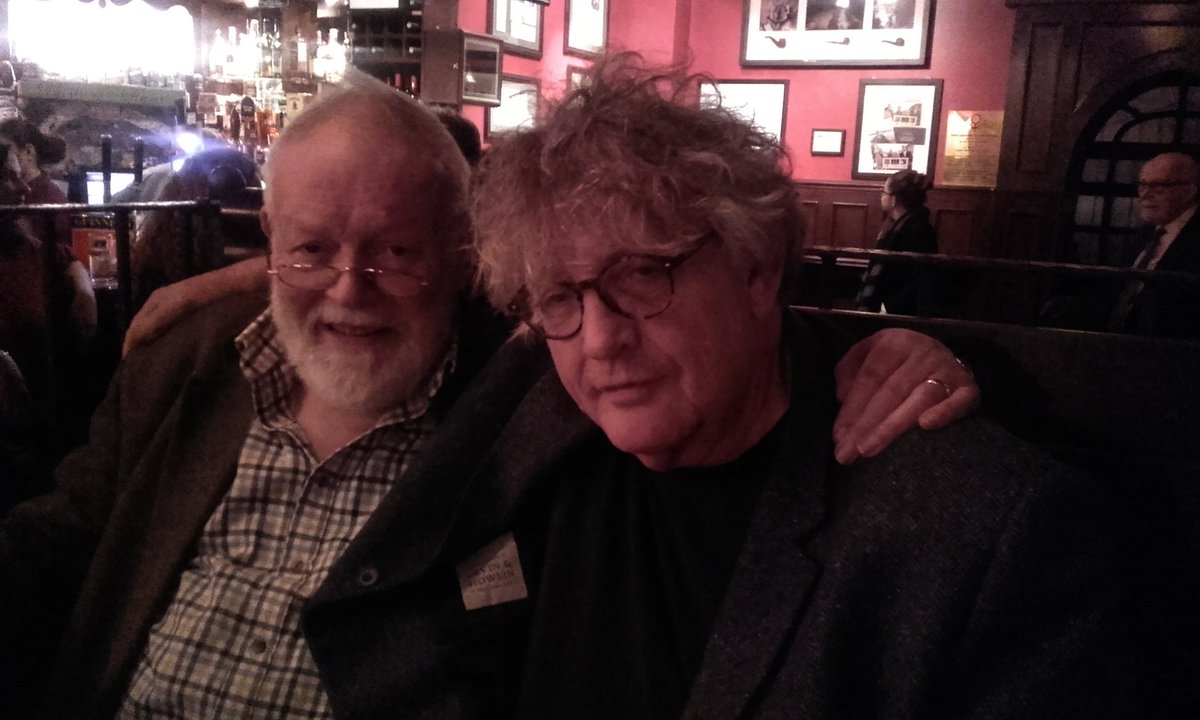“The people who want a hard Brexit probably don’t read poetry,” said Michael Longley in his characteristically calm and reassuring manner; pondering the nature of borders after reading Paul Muldoon’s “The Boundary Commission”.
A very full house at the almost-refurbished John Hewitt pub on Wednesday was treated to an evening of readings by two of the country’s best-loved poets, organized by the John Hewitt Society – to mark Hewitt’s birthday in 1907 – as part of the Belfast International Arts Festival.
But the occasion was also a personal milestone for the two writers, between whom there is an obvious affection that stretches down the years and across the oceans. As Gail McConnell pointed out in her introduction, it was in Armagh during the famous 1968 Room to Rhyme Tour – that Longley, Seamus Heaney and David Hammond were first introduced to the 16-year-old Muldoon.
Both poets of course paid tribute to the ghost of the evening’s host. Longley read from Hewitt’s “The Hill Farm” – a beautiful poem about finding oneself outside a Catholic neighbour’s house while the family is at prayer – and connected it to Heaney’s “The Other Side”, written from the inside of the house looking out; from one community to the other. Hewitt’s work, Longley said, “displays a breadth of spirituality that we need today.”
The approaching centenary of the end of the First World War was another theme of the evening, and Longley invoked the young war poets – offering a moving vision of Wilfred Owen safely crossing a pontoon bridge instead of perishing just one week before the armistice – and the resting place near the French village of Ors; alongside a poignant reference to Longley’s own father in “Harmonica”.
In a review last year of Longley’s collection Angel Hill, Fran Brearton wrote for The Guardian that “The young soldiers of the first world war… are a generation who have been better served by Longley than by any other living poet.”
Longley also spoke of his recent trip to Tokyo to receive the Yakamochi medal – named after the creator of Japan’s oldest collection of poetry – and talked about how, despite a gap of 1300 years, he felt connected to the long-dead Japanese poet through their love for birds and flowers. That sense of oneness with nature was given life in Longley’s final reading, “After Amergin”.
You have crossed the water to visit me
After a break, Muldoon began by reading Hewitt’s “Hedgehog” and then his own poem of the same name.
He too conjured the trenches of the Great War, with his poem “Truce” about the Christmas ceasefire, with its resigned realization, despite a fleeting celebration, that the slaughter would inevitably begin again.
Muldoon also read two poems of death and loss. “Turkey Buzzards” for his late sister, and “At Least They Weren’t Speaking French” a bittersweet, lyrical exploration of family and history, with its distinctive refrain “fol-de-rol, fol-de-rol, fol-de-rol-di-o.”
Perhaps the most moving moment came when Muldoon read from Longley’s poem “Second Sight” – with its closing lines ‘If I could walk in on my grandmother/She’d see right through me and the hallway/And the miles of cloud and sky to Ireland/‘You have crossed the water to visit me’ – after which, amid applause, the two men exchanged a fond hug.
The whole evening was a joy to behold and a rare treat for those lucky enough to squeeze into the pub’s friendly confines.
The previous day, Muldoon had been at Trinity College in Dublin to deliver the fifth annual Edmund Burke lecture, on the subject of The Poet as Citizen.
On Friday night at The MAC in Belfast, he’ll be taking part in a live performance of “The Lament for Art O’Leary” based on his translation of what has been described as the greatest love poem in the Irish language; with music by probably the greatest of all Celtic rock bands, the ageless Horslips.
Also published on Medium.

